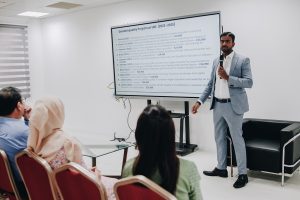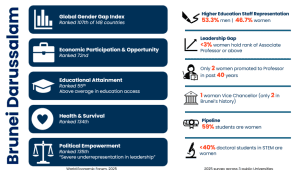New research highlights gender gap in Brunei universities
Posted on: 3 November, 2025

New social sustainability research from the University of the Built Environment has revealed a disparity between women’s academic participation and leadership representation in Brunei.
The British Council-funded study reveals that “fewer than 3 per cent of positions at Associate Professor and Professor levels are held by women”. This is despite women now outnumbering men in university enrolment and accounting for nearly half of academic staff across Brunei’s public universities.
The research, entitled ‘Embedding Equity, Diversity, and Inclusivity in Higher Education: Framework Development and Capacity Building in Brunei‘ was led by Dr Muhammad Rana and Professor Angela Lee from the University, in collaboration with Universiti Brunei Darussalam.

Gender Gap Report similarities
At present in Brunei, situated in Southeast Asia, there is only one female Vice-Chancellor, the second in Brunei’s entire tertiary education history. Further, only two Bruneian women have been promoted to full Professor over the past four decades.
The findings place this disparity in a wider national context. According to the Global Gender Gap Report 2025, Brunei ranks 107th out of 148 countries overall. The country performs better in education but lags behind in senior professional participation.
These patterns echo gender challenges in Brunei universities. While women excel at entering and completing higher education, their progression into senior academic and leadership positions stalls.
The absence of structured gender offices, mentoring schemes, and leadership pathways, common in countries like the Philippines and Malaysia, further limits women’s advancement, according to the report.

Social sustainability and active inclusion
Professor Lee said: “Advancing gender equity is not only a social sustainability issue, but a strategic leadership challenge for the built environment and beyond – shaping how institutions design, plan and manage for inclusion.”
The research team devised six recommended actions:
- Embed gender equality and diversity policies within universities.
- Create leadership pathways and highlight female role models.
- Expand mentoring and sponsorship opportunities.
- Ensure transparent promotion and recognition systems.
- Strengthen collaboration with ASEAN peers to share best practices.
- Actively involve men as allies to embed equality across academic culture.

“Essential steps” towards gender equality
Dr Rana said: “Together, these measures could help Brunei consolidate its progress in education access while tackling persistent barriers to women’s leadership: an essential step if the country is to align with regional standards and global gender equality goals.”
The findings were presented at SEA-UK GEDI Leadership Forum, which took place in London on 29–31 October 2025.
A downloadable version of the report can be found here: Gender Equality in Brunei Darussalam and ASEAN Higher Education – University of the Built Environment Repository



